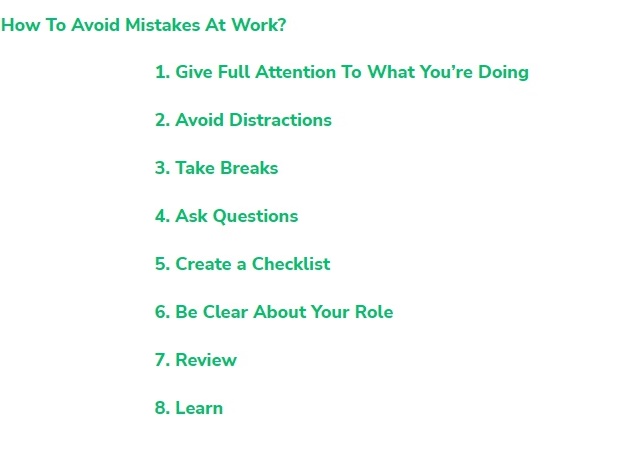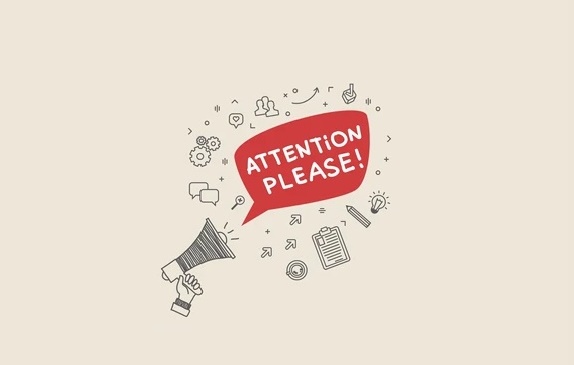Avoid mistakes at work
How to avoid Mistakes at Work?
We are bound to make errors in any task we undertake. Mistakes are a natural part of work and often happen unknowingly. When we push ourselves too hard or work longer than necessary to achieve our goals, blunders become inevitable. Even the most meticulous and perfection-driven individuals are not immune to occasional mistakes or careless oversights.

Mistakes can occur from simple oversights, such as overlooking report numbers or sending emails to the wrong recipient. While many common errors are avoidable, some can be serious enough to put your job at risk. However, making mistakes is also a valuable learning experience that can contribute to personal and professional growth, ultimately helping you become a better, more mindful individual.
Stop multitasking, eliminate distractions, use a task tracker or checklist, ask questions to clarify any confusion, review your work, get a second pair of eyes to check it, take regular breaks, recharge with mental pauses, and look for ways to automate your workflow—these are all effective productivity-boosting strategies. While it can be challenging to approach work with a sense of humor, applying these tips can significantly reduce errors in your professional tasks and improve overall efficiency.
To avoid mistakes at work, it’s essential to prioritize attention to detail. Always double-check your work, especially when handling sensitive or important information. Clearly understand the expectations for each task, and don’t hesitate to ask for clarification when needed. Organize your tasks by priority and use checklists to ensure nothing is missed. Before submitting any work, thoroughly review it for errors—paying close attention to spelling, grammar, and accuracy. Take regular breaks to maintain focus and reduce fatigue, and avoid multitasking, as it often leads to oversights. Most importantly, learn from past mistakes to help prevent them from happening again.
Maintain an organized workspace to locate resources efficiently. Utilize technology like spell-checkers and project management tools. Follow established procedures and seek feedback from colleagues or supervisors. Manage stress through techniques like deep breathing or mindfulness. Continuously update your skills and knowledge in your field. Set realistic deadlines to avoid rushing through tasks. Hold yourself accountable for your work, and if a mistake does occur, take responsibility and work towards a solution. Cultivate a positive attitude to approach tasks with confidence and reduce anxiety. Remember, mistakes are learning opportunities; use them to grow and improve.
✔ Pay more attention
While working, it's important to pay close attention to every detail. Juggling multiple tasks or frequently switching between activities increases the likelihood of overlooking or neglecting important elements. When you try to handle several tasks at once, you cannot give each one your full attention. Instead, you're dividing your focus, which can reduce the quality and accuracy of your work.

Multiple studies have demonstrated the ineffectiveness of multitasking. However, making small adjustments to your work habits can significantly improve performance. Every task you undertake deserves your full attention. Eliminate all forms of distraction while working—focused attention is essential for accuracy and quality. Give your best effort, and continue striving for improvement.
? Take your time to review your work carefully.
? Double-check important details such as numbers, dates, and names.
? Use checklists to ensure all required tasks are completed.
✔ Refresh your mind
If you work too hard for extended periods, you're more likely to make mistakes. Studies have shown that prolonged overworking can negatively impact sleep, increase the risk of depression, and impair your ability to think clearly. According to the Harvard Business Review, overworking also affects memory and decision-making abilities. Taking regular breaks from work allows you to step back from stressful situations, recharge mentally, and return with improved focus and productivity.

You may keep your mind sharp by playing games, working out, taking a stroll, and other activities. This can help you concentrate better at work and prevent blunders. The break is equally crucial to your job.Without a break, your job might get distracted and lead to errors. While working for a while, you frequently take breaks. As a result, prioritize both your work and your break equally.
? Take Short Breaks.
? Get Some Fresh Air.
? Listen to Music.
✔ Work without doubts
To avoid making mistakes, it's essential to fully understand the task or questions at hand. Often, errors stem from simple misunderstandings or lack of information. If you're unsure about any aspect of your work, it's always better to ask questions and seek clarification before proceeding. Don't hesitate to reach out to a colleague or manager who has more experience or expertise—they can provide valuable guidance and help ensure accuracy.

We encourage you to remember that asking questions is a powerful tool for learning and growth. Don’t feel embarrassed or hesitant—seeking clarification only helps you become more informed and confident in your role. A strong understanding of your responsibilities leads to greater accuracy in your work. Make full use of the informational resources available to you, and always strive to do your best. Asking questions not only enhances your knowledge but also fosters meaningful discussions that can serve as valuable learning opportunities.
✔ Work-out your Plan
Using checklists and to-do lists plays a crucial role in preventing errors at work. They are especially helpful when you have multiple tasks to manage. A checklist keeps your workflow organized and ensures that no important steps are overlooked. By clearly outlining the processes required to move to the next stage, checklists make it easier to stay on track and reduce the likelihood of mistakes.

Digital tools are another valuable option to help improve productivity and reduce errors. Platforms like Monday.com, Trello, Basecamp, SmartSheet, and Asana allow you to seamlessly manage and switch between tasks. You can get a head start by creating a checklist to stay organized. Based on that checklist, you can further develop your ideas by using mind maps and other visual diagrams to clearly represent the connections between tasks and concepts.
Additionally, you can make use of digital tools such as Monday.com, Basecamp, SmartSheet, Asana, Trello, and others. These technologies help you manage your workload efficiently and switch between tasks with ease. A good starting point is creating a checklist to organize your tasks. Based on the checklist, you can further develop your ideas using mind maps and diagrams, which visually represent the connections between tasks and help you understand the workflow more clearly.
✔ Review your work
The most crucial part of any task is the review process. Before submission, it's essential to carefully evaluate your work. In stressful situations or when deadlines are tight, it’s common to submit work without making necessary revisions. However, taking the time to thoroughly review your work before publication, submission, or client presentation can significantly improve quality and reduce errors.

Continuously reviewing your work allows you to identify and correct errors, helping you become a better version of yourself while building credibility and confidence in your work. The evaluation process also highlights areas where improvement or behavioral adjustments may be needed, enabling more effective performance and collaboration. Therefore, the review phase is one of the most critical steps in any task or project.
✔ Learn from mistakes
If you make a mistake, you shouldn't feel upset or anxious. Whether the mistake was made by you or a colleague, it presents a valuable opportunity to learn and take steps to prevent it from happening again. Mistakes are a natural and necessary part of growth and improvement—they help you become better. In fact, making mistakes is often a crucial step on the path to success. To grow from them, it's important to keep track of your errors, reflect on them, and take conscious actions to avoid repeating them in the future.

View your mistakes as lessons that can help you improve—not just for yourself, but also for those around you. Maintaining a positive outlook on your errors is essential, as they serve as stepping stones for learning, growth, and even innovation. You can't truly learn from a mistake until you acknowledge it—trying to cover it up only hinders progress. So take a deep breath, accept responsibility, and remind yourself that you are actively working toward a solution.






